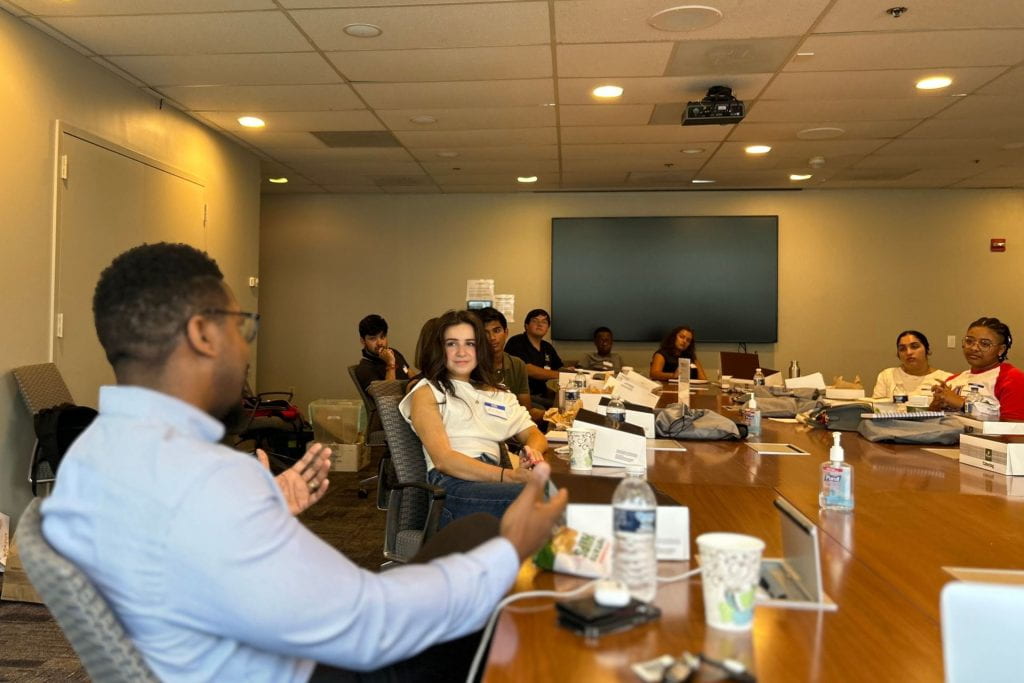
Open to all majors! No background in INTA or PUBP necessary.
GTDC will offer two courses (3 credits each) that each student must take during the semester: one from Public Policy and one from International Affairs. Possible course offerings are listed below. Each semester’s two courses will be chosen with input from the students so as to best match the needs and interests of the cohort.
Fall 2025 and Spring 2026 Courses
- INTA 3110: US Foreign Policy
- PUBP 4226: Business and Government
Each semester, course offerings will be customized to best meet the needs and interests of each student cohort. For example, GTDC can offer courses that fulfill the humanities and ethics (Core Area C) and social science (Core Area E) requirements for GT undergraduate students. Specialty courses on international affairs or public policy can also be offered. Applicants will be surveyed for their preferences and final course offerings will be listed before non-refundable deposits are paid. The Schools of Public Policy and International Affairs will each offer one course.
Note that these courses can be used towards a minor or major in either International Affairs or Public Policy. Some may also apply towards the International Plan or the Georgia Legislative requirements for United States and Georgia history and constitution content.
Courses will be taught by regular INTA and SPP faculty. Assignments will be designed to complement other aspects of the students’ D.C. experience (e.g., how to write professional policy briefs; using expert data sources; professional presentation and networking practices). They will feature guest lecturers who are prominent D.C.-based professionals, successful Georgia Tech alumni, and Georgia Tech professors. The students may also participate in joint classroom exercises with the home campus in Atlanta. Each course will meet once a week for three hours in the evening. The classroom is located in the same building as the student housing accommodation.
Possible course offerings are listed below. Each semester’s two courses will be chosen with input from the students so as to best match the needs and interests of the cohort.
Potential Course Offerings
C = Satisfies Core Area C (Humanities, Ethics) requirement.
E = Satisfies Core Area E (Social Sciences) requirement.
GSLR = Satisfies Georgia State Legislative Requirements (GSLRs).
IP = Counts towards International Plan.
LST = Counts towards LST Minor or Pre-Law Certificate.
Jimmy and Rosalynn Carter School of Public Policy
PHIL 3050 Political Philosophy (C)
Explores the main currents in political philosophy, with a focus on American political thought, from antiquity to the present, with applications to contemporary debates about policy and political process.
PUBP 3020 Applied Political Economy (E)
This course explores the fundamental interactions between politics, economics, and policy. It examines how even non-partisan, scientific policy solutions can have distributive consequences that affect their design, passage, and implementation. Students will learn to apply political-economic analysis to current topics in American politics and policy.
PUBP 3030 Policy Analysis (E)
The science and craft of policy problem-solving, analysis, and advice. Economic and political approaches and techniques for analysis of costs, benefits, and risks.
PUBP 3510 Politics and Policy (E)
Application of political science and other social science concepts and theories to current issues. Investigates several current topics in detail.
PUBP 4226 Business and Government (E, LST)
How government regulates business and markets, and how business exercises power and influence on government in areas such as antitrust, financial markets, safety and health, and environmental quality.
PUBP 4410 Science, Technology, and Public Policy (E)
Examination of relationships between science, technology, and government, and their mutual influence on public and private decisions.
PUBP 4414 Technology, Innovation, and Policy (E)
Theories and concepts of technological innovation and diffusion, economic development, and the role of public and private institutions in technological development at the firm, industry, regional, national, and international levels.
PUBP 4416 Critical Issues in Science and Technology (E)
Exploration of technology and technological society, going beyond utility and functionality to consider justice, meaningfulness, and self-realization. Perspectives include political economy, aesthetics, and social change.
Sam Nunn School of International Affairs
INTA 1050 The World Today (E, IP)
Introduction to current issues of politics, geography, and history around the globe, using a wide variety of media and sources.
INTA 1110 Introduction to International Relations (E, IP)
An introduction to the major principles, concepts, actors, and theories of the international system and their application to current issues in world affairs.
INTA 1200 American Government in Comparative Perspective (E, GSLR)
Examines American government in relation to other political and economic systems in countries around the world. Credit not allowed for both POL 1101 and INTA 1200.
INTA 2040 Science, Technology, and International Affairs (E, IP)
An overview of science and technology as a determinant in the development and functioning of states and societies worldwide and the international context for the development of science and technology.
INTA 3050 The Meaning of Global Citizenship (E, IP)
Explore the meaning of global citizenship in scholarly and public debates and how it is “practiced” by individuals and “institutionalized” by universities, corporations and organizations.
INTA 3110 U.S. Foreign Policy (E)
Analyzes the formulation and implementation of America’s foreign policy from 1914 to the present, stressing economic, political, and strategic factors.
INTA 3111 U.S. Defense Policy (E)
Examines contemporary American defense policy, including the formulation of strategy, the defense budget, force structure, and nontraditional uses of military force.
INTA 4011 Technology and Military Organization (E)
Addresses the impact of technological developments on the evolution of military organization and on international conflict.